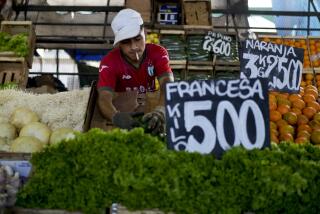Venezuela’s economic, political woes knock its currency to its knees
- Share via
BOGOTA, Colombia — Capital flight, political instability and misguided attempts to rein in double-digit inflation are being blamed for the weakening of Venezuela’s currency on the black market, where it has fallen more than 75% against the U.S. dollar since April.
The sharp drop in the value of the bolivar has occurred as economic problems grow more acute for President Nicolas Maduro, the late Hugo Chavez’s handpicked successor, and political divisions between Chavistas and the opposition become wider and more violent.
Traders said Thursday that a dollar cost as much as 37 bolivars, compared with the unofficial rate of 21 to 22 as recently as April, when Maduro narrowly defeated Henrique Capriles in the election to replace Chavez, who died in March.
The official exchange rate is 6.3 “Bs” to the dollar through government agencies, although that price is rarely available. Venezuelan individuals and businesses needing dollars for foreign travel or to import goods and services generally must resort to the black-market exchanges.
Alejandro Arreaza, Latin America economist for Barclay’s Bank in New York, said the government had fed the inflationary fires by beginning to print huge quantities of money last year, money used to underwrite voter giveaways aimed at boosting Chavez’s popularity during his reelection bid in October and Maduro’s bid in April.
“The increase in government expenditures has a lot to do with this,” Arreaza said. “Until last year we had seen relative stability in the currency markets.”
In addition, he said, capital flight is underway, with Venezuelans desperately trying to acquire dollars to deposit or invest offshore for fear that even greater devaluations are on the way. Also seeking dollars are the increasing numbers of Venezuelan companies and individuals uncomfortable with the country’s socialism and looking to cash out and move elsewhere.
Much of the capital flight has to do with political uncertainty in the aftermath of the April election, according to Amherst College political science professor Javier Corrales. Capriles challenged the results as fraudulent, but the Venezuelan Supreme Court rejected his lawsuit, citing a lack of evidence. The court also called on prosecutors to open a criminal case against Capriles on charges of slandering officials.
This week, some Chavista legislators, claiming misuse of funds, called for the arrest of Capriles, who is governor of Miranda state. Analysts say the detention of Capriles, who captured nearly half the vote in April, could set off widespread chaos. In May, several opposition lawmakers were physically attacked by members of the Chavista PSUV party on the floor of the National Assembly.
“The April election had a huge impact,” Corrales said. “ It has weakened Chavismo as a political force.”
Arreaza said the government was trying with little success to control inflation by keeping the official exchange rate low, since more than half of consumer goods are imports. But the strategy isn’t working: The inflation rate this year will probably reach 45%, by far the highest in South America, he said.
Jose Manuel Puente, an economist at the IESA think tank and graduate school in Caracas, said “macroeconomic imbalances” in Venezuela meant the country’s economy would be the worst in Latin America this year.
“The slowdown in economic growth, high and persistent inflation and high levels of scarcities [of basic foodstuffs] will combine to make Venezuela’s the worst-performing economy on the continent, despite the extraordinary oil boom that the country is still benefiting from,” Puente said.
Maduro this week appointed Eudomar Tovar president of the Venezuelan Central Bank. Tovar was formerly head of the Cadivi agency, which is responsible for dispensing dollars at the official rate in cases the government deems appropriate.
Tovar will take over a program in which the government says it auctions dollars to the highest bidders. That program hasn’t worked because it has been mismanaged, said Arreaza.
“Everybody’s losing — the government, the private sector and especially the people. The black-market rate is what merchants use to sell scarce items [on the black market], and that turns into higher inflation and a deteriorating quality of life,” he said.
Special correspondents Kraul and Mogollon reported from Bogota and Caracas, respectively.
More to Read
Sign up for Essential California
The most important California stories and recommendations in your inbox every morning.
You may occasionally receive promotional content from the Los Angeles Times.













